ReadTheory is a powerful tool in the hands of educators. But like all tools, there are strategies to maximize its benefits. If you hold your paintbrush by the bristles, painting becomes a lot harder. Here are our tips and tricks for getting the most out of ReadTheory.
Do Set Knowledge Point Goals
As your students work through ReadTheory, they’ll be earning knowledge points for every question they answer correctly. If it’s one of our challenge questions, they earn three points. The big ways to earn points though are through passing a quiz (15 bonus points) or getting a perfect score on a quiz (another 15 bonus points).
You can motivate your students by setting a weekly knowledge point goal for them as individuals, or make it a whole class goal with some larger reward. I used PAT (Preferred Activity Time) on Fridays and would give bonus class time if we’d met our ReadTheory point goal for the week. Here are some awesome PAT resources if you’re new to the concept. With older students, I would set a goal of 150 points/week and grade them based on whether they met that point goal.
Because the point bonuses for passing and perfect scores are so huge, they are a huge motivator for students to slow down and actually do their best on each quiz. They are also easy to keep track of! On the progress report page, you can set and apply a date field so you can see at a glance which students have met the goals and where you stand as a class.
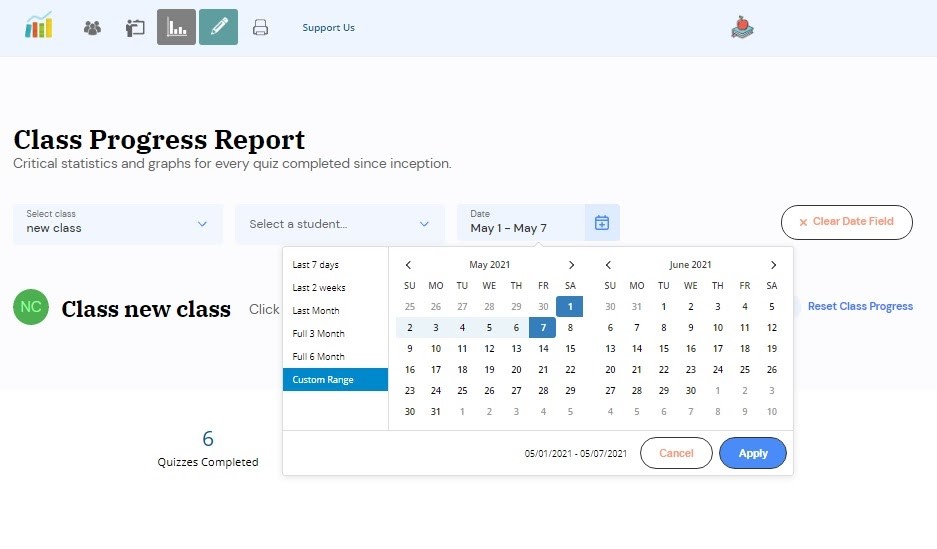
And now you can see only the data from within those dates:
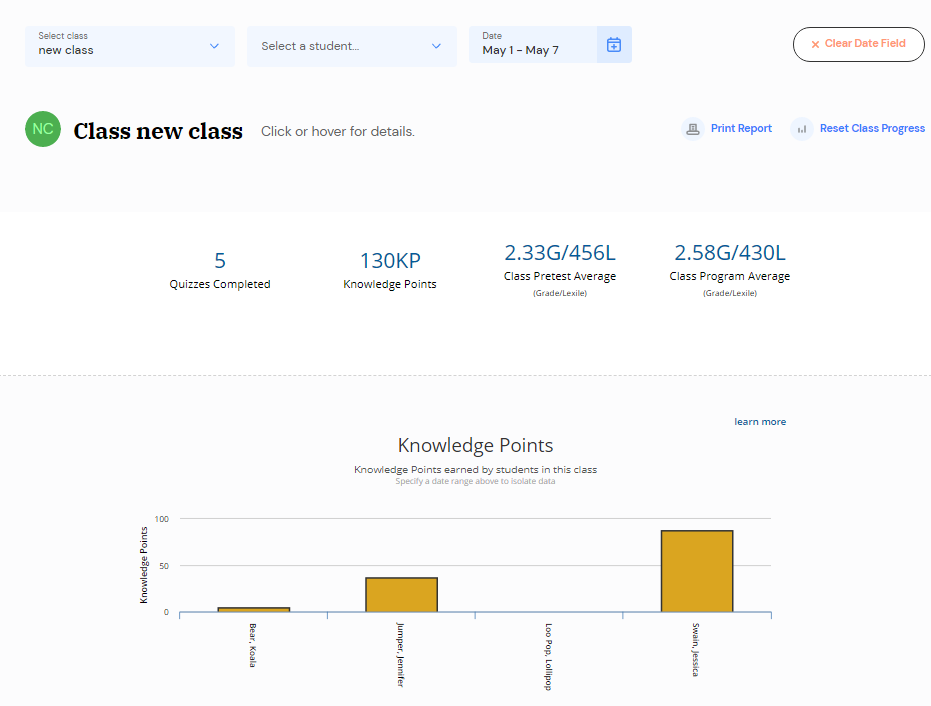
Don’t Focus on Grades or Grade Levels
ReadTheory adapts based on student performance. This means that if a student does really well, they’ll begin to see harder passages and questions. This is great for providing differentiation to gifted students, but it can also mean that your brightest stars in the classroom have the lowest percentage scores in their quiz history. This is good! It means these students are being actually challenged!

While it can be tempting to make “Complete 5 ReadTheory Passages this week” your goal, this goal misses the mark at the high and low end of your students. Both groups of students may find that it’s much easier to simply randomly click through passages to complete the assignment. This is not what we want.
By focusing on earning knowledge points, every student is on an even playing field and motivated to do their best.
Do Look at the “Big Three”
When looking over your students’ results, don’t skip over the “Mastery of ELA Common Core Standards” graph. This graph holds insights into the types of questions your students may be struggling with. Clicking the “learn more” button in the top right gives you an overview of the types of questions your students are struggling with.
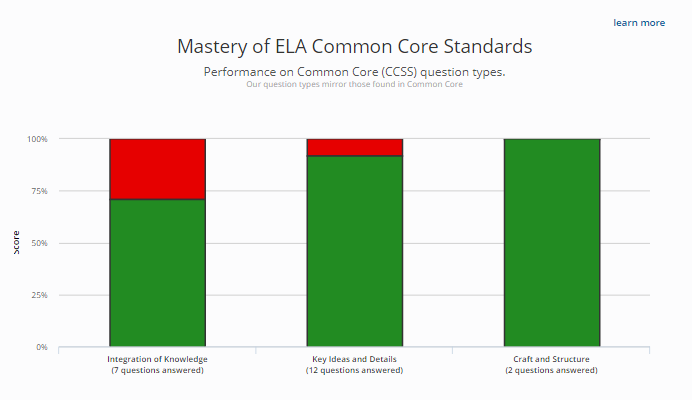
You can use this information along with the question stems to plan more targeted interventions for your students. I found that my students really struggled with inferences after diving into this data, so I took that into account when planning my review activities just before exams. Check out Jana’s article on how she breaks down the Craft and Structure section of the ELA standards.
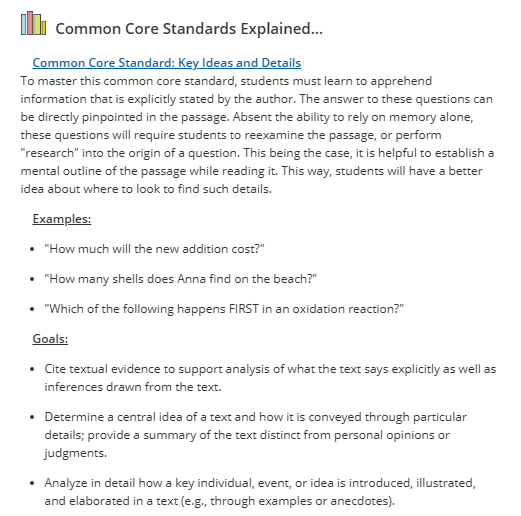
Don’t Forget To Review Individual Quizzes
We all know the power of closely reviewing a students’ work and providing individual feedback. While ReadTheory does this for you automatically, it also allows teachers the ability to review students’ individual responses to questions.
On a student’s individual progress report page, you can click the title of any of the student’s quizzes to view their responses on individual questions. Doing this type of question-by-question review is a great way for determining more specific areas of weakness a student may be having. I also loved doing these types of reviews in 1-1 conferences with my students to get a better sense of their thinking.
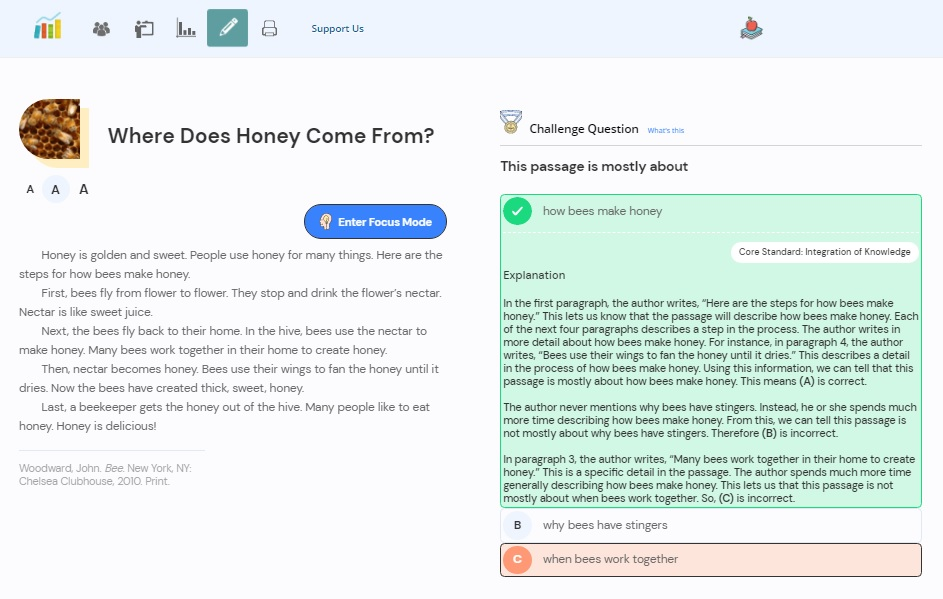
Do Make it a Routine
No matter how you utilize ReadTheory in your classroom, do your best to be consistent. My students always knew that their second rotation was ReadTheory during our small group time. This daily use made it easy to use ReadTheory in classroom competitions, celebrations, and assignments. Make it your own, be enthusiastic, and ReadTheory can be an amazing resource for assessing your students.




8 replies on “Using ReadTheory for Assessments: A Quick “Do and Don’t” Guide”
Great ideas! Thank you! How many knowledge points did you ask your students to get each week?
I would ask students to earn 150 points/week as a good starting point. This usually meant students had to complete around 8 quizzes/week. Totally manageable.
Did you ask each student to earn 150 points per week or 150 points for the entire class? Right now I am asking the kids to take two tests as morning work on Monday and Wednesdays.
Great question! Sorry for being vague. 150 points/student each week was my goal. They should be earning close to 100 points/week if you’ve got them answering 4 quizzes each week.
How can teachers obtain students’ pre-test scores?
Greetings!
Students’ pretest scores appear on the whole class progress report as gold diamonds. Scroll down to the grade and lexile graphs and you’ll see gold diamonds on their bar graphs indicating their pretest score. These are also available on their individual progress report pages AFTER they complete the pretest and ONE additional quiz.
Please let me know if I can assist further.
-Stacy D.
ReadTheory Support
Is there a way to keep it on a grade level for the kids that just need the practice and it not keep getting harder and harder??
Hi! Unfortunately, there is no way to keep a student on one specific level. However, the site is designed to be adaptive. The quizzes will only get harder if students get 100% on them.